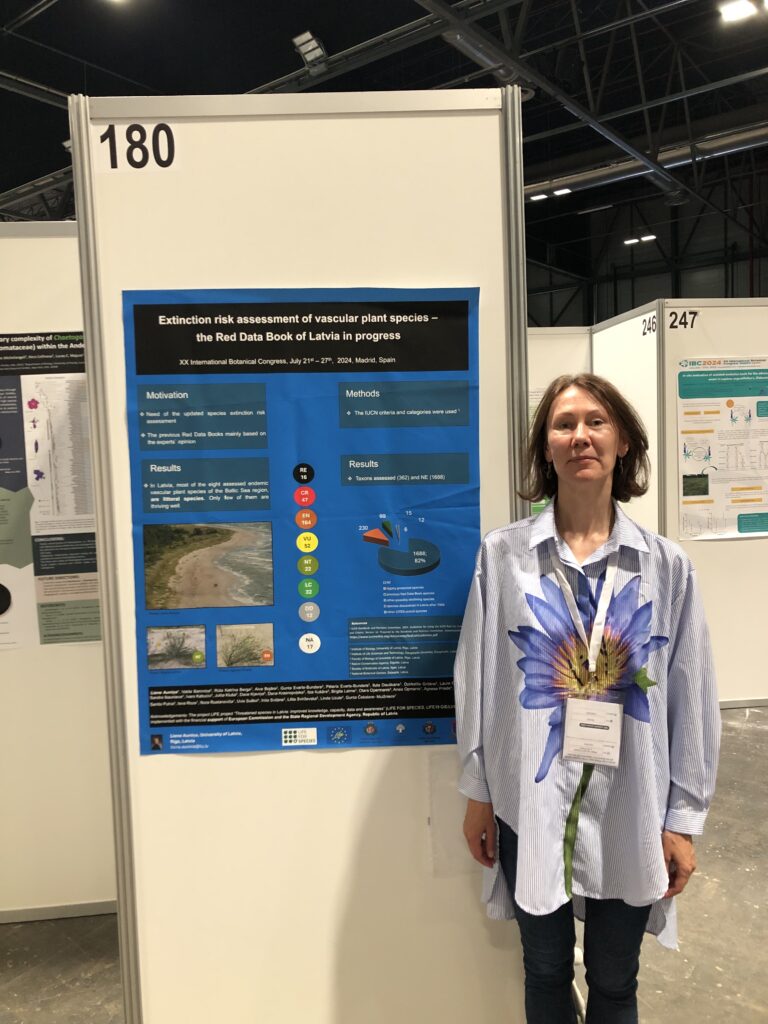LIFE FOR SPECIES project represented at international Botanical Congress.
Liene Auniņa, the coordinating species expert for vascular plant species from the project LIFE FOR SPECIES, from the Institute of Biology (University of Latvia), participated in the XX International Botanical Congress (IBC) in Madrid, Spain, 21-27 July 2024.

The IBC is one of the most significant meetings for botanists, which takes place every six years under the supervision of the International Association for Botanical and Mycological Societies (IABMS). The Congress included the opening lecture, 6 plenary lectures, 18 keynote lectures, 4 public lectures, concurrent 267 symposia, as well as short courses and workshops. There were 1608 talks and c. 1400 posters in the congress. The number of registered botanists was 2998 from all continents. There were 40 symposium topics, covering Systematics, Conservation Biology, Global Change Biology, Biogeography/Phytogeography, Ecology and Plant Communities etc. Symposia devoted to the synergy of art and botany, the use of plants in traditional medicine, as well as to lifelong botanical education and citizen science also took place in the congress. There were many exhibitors presenting different publishers, Botanical Societies as well as the LIFE project `LIFE4POLLINATORS (LIFE18 GIE/IT/000755) - Involving people to protect wild bees and other pollinators in the Mediterranean` in the congress venue. On the last day of the congress, the Madrid Declaration was approved proposing ten strategic actions for plant scientists, botanical institutions, governments, the corporate sector, and civil society, aiming to address plant life degradation caused by human activities (https://globalplantcouncil.org/the-madrid-declaration/).
Liene Auniņa presented the poster Extinction risk assessment of vascular plant species in Latvia: first results, co-authored by other assessors for vascular plant species in Latvia, under the symposia S.153 Systematics, floristics, and conservation, facilitating data integration to promote sound science. The aim of the presentation was: to introduce the international public (botanists from all over the world) with the results of the evaluation of Latvian plant species according to the IUCN criteria to, and to exchange experience in the research and conservation of rare and threatened species.
Liene Aunina participated in various symposia e.g. Systematics, floristics, and Conservation, facilitating data integration to promote sound science, Inventorying the plant diversity of the Euro-Mediterranean, Integrating taxonomical progress into dynamic web check-lists and electronic floras, Orchid phylogenomics: diversification, trait evolution, and biogeography, The key role of refugia in facing the global biodiversity crisis, as well as in the workshop `World Flora Online: how to get involved`.
Link to the congress website: https://ibcmadrid2024.com/
Conclusions and feedback:
- Participation at the XX International Botanical Congress in Madrid was a great opportunity to present the results of our work to the wider international plant science community.
- The differences in species taxonomy, taxon ranges, and scientific species names among online databases most likely will remain in the future due to the different views of botanists involved. Moreover, new studies bring new knowledge and changes are inevitable.
- Telling species apart using molecular analysis has become a regular task in the world, but it has rarely been used in Latvia so far. We need molecular analysis for several threatened vascular plant taxons and it will be stated in the upcoming Red Data Book edition for vascular plants.
- Effects of climate change on vascular plant species addressed in numerous presentations during the congress as well as the role of pollinators for conservation of rare plant species and plant ecology are only some of the research topics, results of which we need to assess species extinction risks more accurately. I hope, that the next time we are going to assess the species extinction risks in Latvia, not only better data on species distribution and population size, but also results of the studies mentioned above, will be available for assessors.
